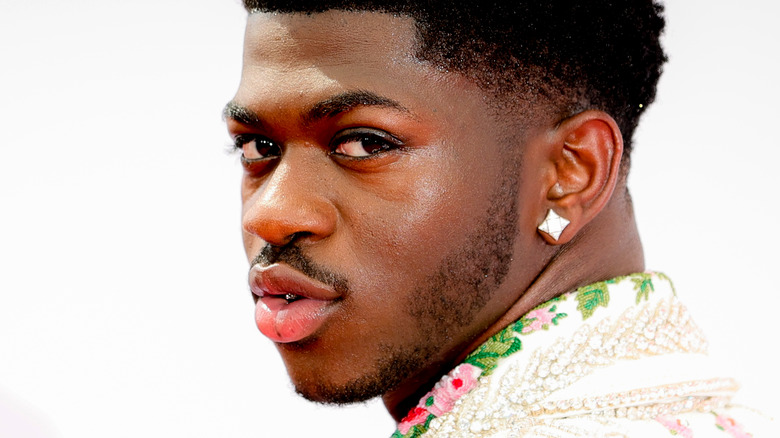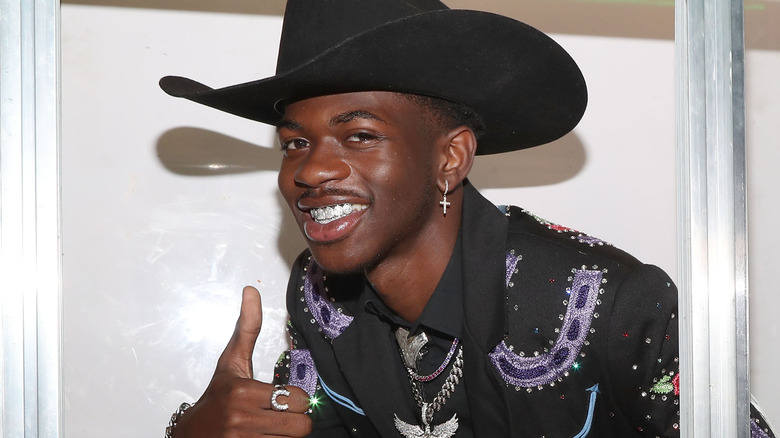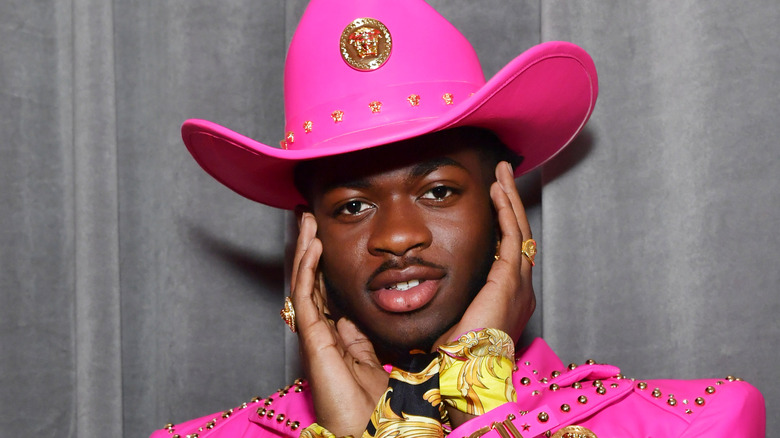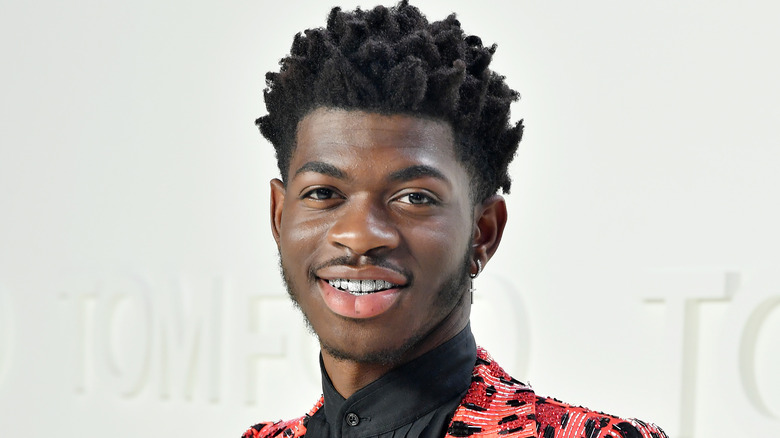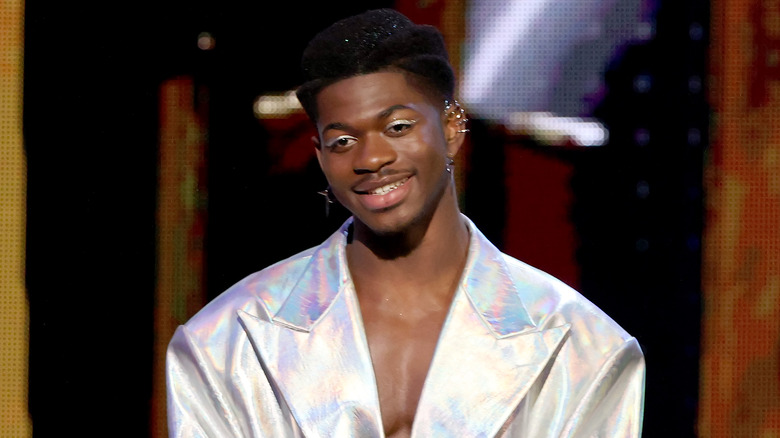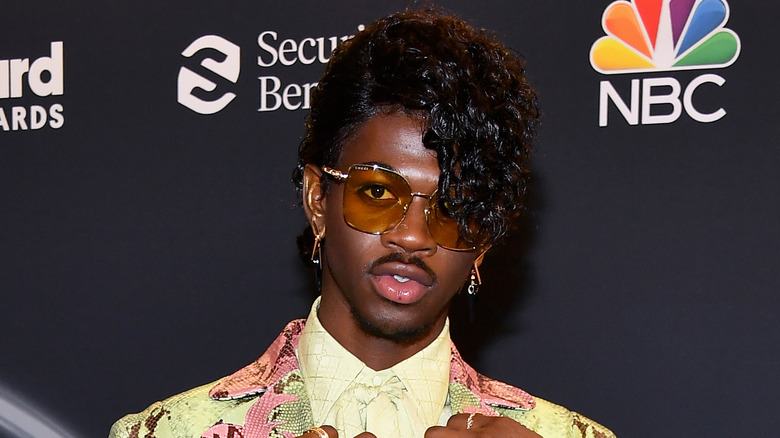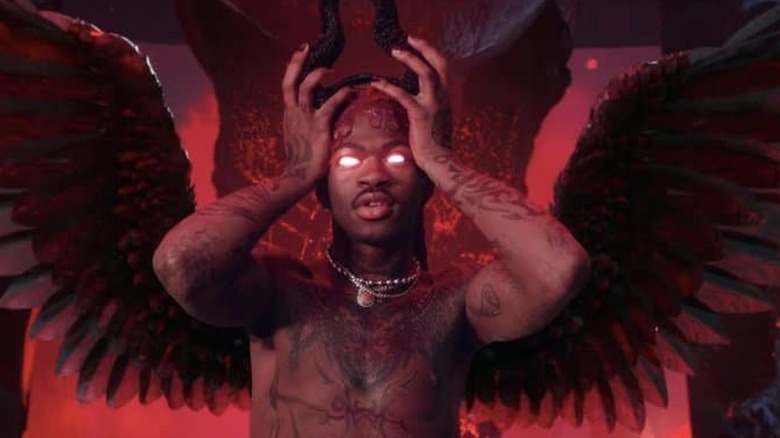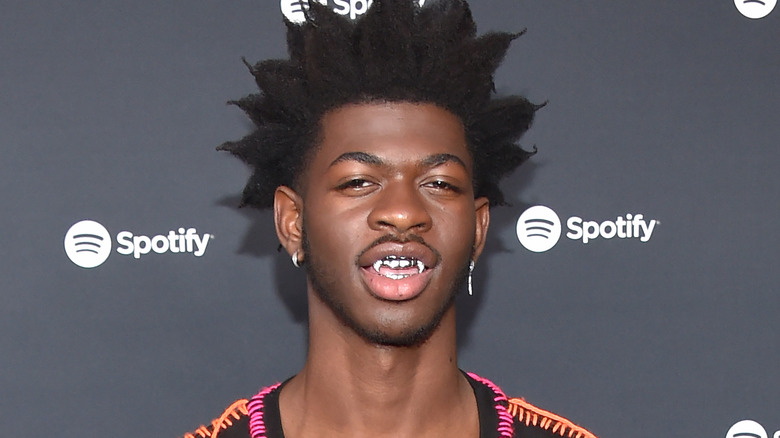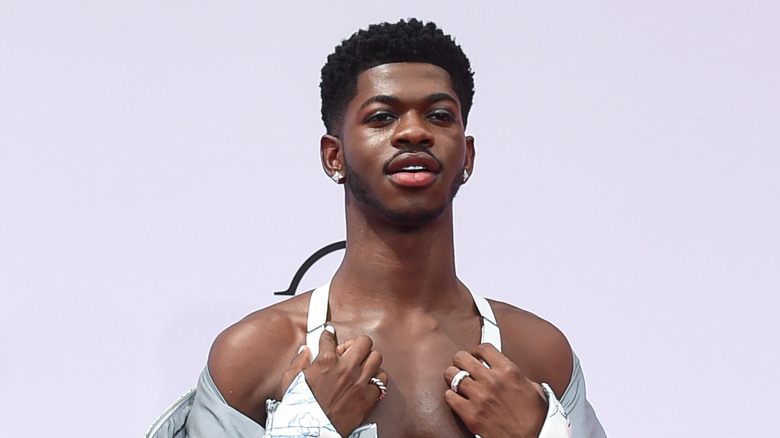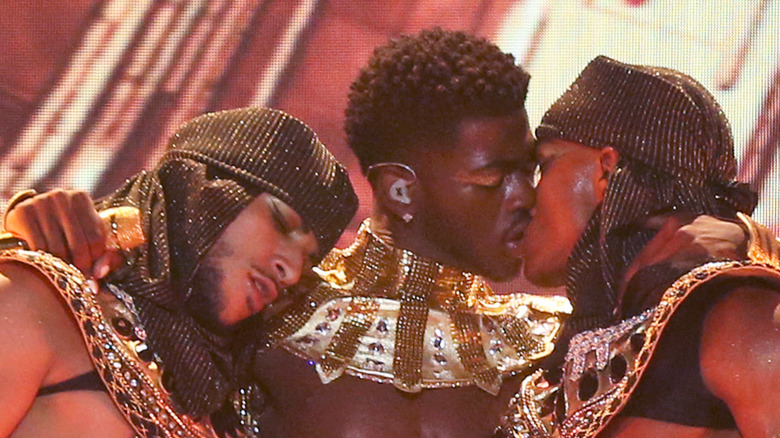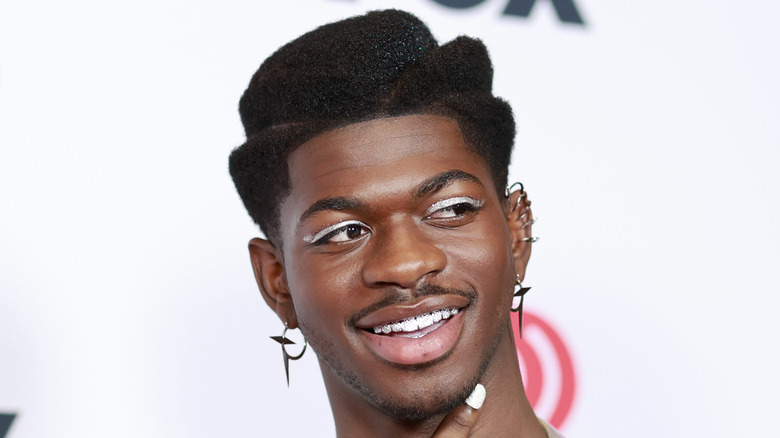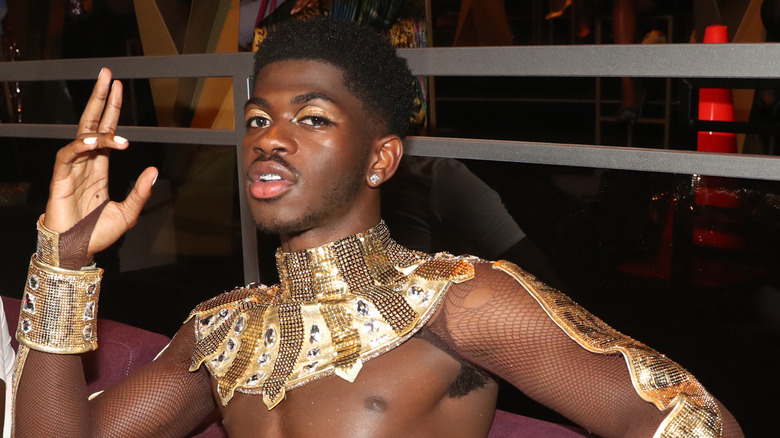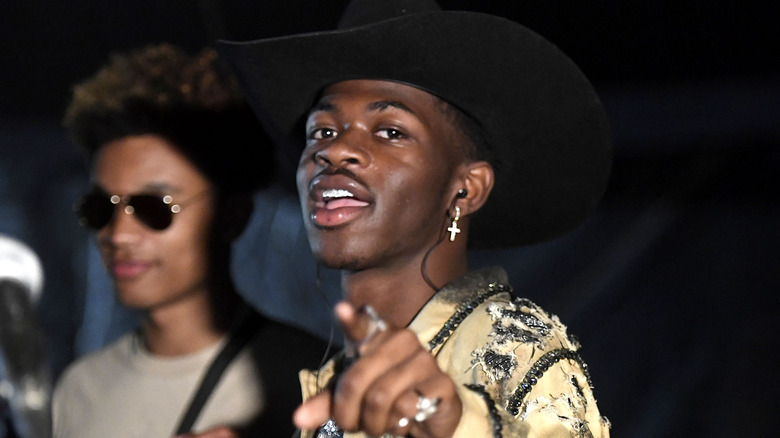Inside Lil Nas X's Groundbreaking Journey As A LGBTQA+ Artist
In the past decade of mainstream music, progress has slowly inched forward in providing stronger representation and opportunities for a variety of LGBTQIA+ artists across a range of genres. And in 2019, LGBTQIA+ representation was further boosted by the appearance of Montero Lamar Hill – better known as Lil Nas X – a young genre-blending musician who seemed unafraid to challenge the status quo of modern culture.
A bold, outspoken artist seemingly driven by authenticity, Lil Nas X seems to hold a desire to remedy the cultural issues that made his own journey as an LGBTQIA+ youth so difficult. As a result, Lil Nas X's journey as an LGBTQIA+ artist has seen him rise the ranks while flexing songs, music videos, social media posts, and style choices that openly challenge bigotry and celebrate selfhood with pride.
In facing constant backlash for his identity from conservative critics, Lil Nas X has refused to diminish his voice or lessen his presence. If anything, he's stepped out bigger and bolder and louder with every criticism hurled his way — and it's been an absolute trip to see him do so. Here's everything you need to know about Lil Nas X's groundbreaking journey as a LGBTQIA+ artist.
Coming out at the peak of his popularity
In the midst of "Old Town Road"s record-breaking run atop the Billboard Top 100 (via Billboard), Lil Nas X made a decision that he feared could "overshadow" his career (via People): He came out as a member of the LGBTQIA+ community. The groundbreaking artist made the announcement at the end of Pride month in a Twitter post punctuated by a rainbow emoji, "Some of y'all already know, some of y'all don't care, some of y'all not gone fwm no more," he wrote. He then finished the post by suggesting fans "listen closely to C7osure," his song exploring selfhood and growth.
In an interview with The Guardian, Lil Nas X revealed that his sexuality was previously something he thought he'd forever keep to himself, "The honest truth is, I planned to die with the secret," he said, "But that changed when I became Lil Nas X." Subsequently, the hip hop superstar has been championed as a positive influence, and proof that being openly LGBTQIA+ shouldn't be detrimental to your life opportunities or success.
Per Today, in 2021, Lil Nas X received an Honoree at the Native Son Awards, where he described coming out as "one of the scariest moments" of his life – but one that he hoped would open doors for others. "Far too many of our youth are struggling to find acceptance," he said, "I made the decision to be myself and open doors for the rest of my life."
Redefining how country music looks and sounds
Though there had been a growing number of openly LGBTQIA+ artists and Black performers within country music prior to the genre-blending smash hit of "Old Town Road," the song's success boosted the visibility of marginalized groups within the genre. As reported by GQ, Lil Nas X's hit song "didn't emerge from a vacuum," with the internet developing a fixation "on the majesty of the Black cowboy" as part of what Bri Malandro has since dubbed "The Yee-Haw Agenda" in a celebration of Black cowboy culture on Instagram.
Despite Lil Nas X becoming the first openly LGBTQIA+ Black artist to win a Country Music Association award (via Los Angeles Times), the legitimacy of "Old Town Road" as a country song was called into question when Billboard removed it from the Hot Country Chart. According to CBS News, Billboard released a statement suggesting the hit "does not embrace enough elements of today's country music to chart in its current version."
The decision raised eyebrows, not least of all those belonging to the artist himself who called the tune "a country trap song," and pointed out that Florida Georgia Line and Bebe Rexha's "Meant to Be" was allowed on the country charts and "there's trap drums on that." (via Billboard). Speaking to Teen Vogue, Lil Nas X called the country music scene "guarded" and suggested that only "known country artists" could get away with such genre experiments, but that "a Black guy who raps" can't top the country charts doing the same.
He highlighted the intersectional challenges faced by LGBTQIA+ Black people
"Old Town Road" may have helped to deepen conversations about marginalized people within country music, but Lil Nas X's coming out also generated a deeper dialogue about the intersectional challenges experienced by LGBTQIA+ Black people overall. As a Time profile mused about the young cultural "outlier," "There aren't many Black stars in country music; there aren't many queer stars in hip-hop. There aren't many Black stars in American culture, point-blank." Lil Nas X broke several barriers in one deft swipe, and by all accounts, it didn't come easily for him.
In an interview with GQ, the rapper shared that growing up in a Christian household in Atlanta "didn't allow him the space" to be himself. "That was one of the main reasons why I never wanted to be gay," he said, "I even thought ... 'It's going to go away. God is just tempting me.'" Lil Nas X further expanded on the difficulties he faced "growing up to hate" his sexuality as a Black gay youth during an episode of HBO's "The Shop: Uninterrupted." Comedian Kevin Hart interrupted the rapper to question "what" he was hating and "why," to which the rapper responded, "Homosexuality, gay people," and added, "Come on now, if you're really from the hood, you know."
Hip hop's homoerotic fashion hero
Lil Nas X didn't just extend his voice and public profile to proudly proclaim his sexuality (and support other LGBTQIA+ youth in the process); he also boldly showcased it via an endless array of bold style choices that challenged gender norms and industry expectations. The outlandish performer, who once described his personal style as being "risky, vibrant, camp" (via W), strut out in queer reimaginings of male red carpet looks: A bubblegum pink Versace leather suit, complete with a studded chest harness (via PopSugar); A Christopher John Rogers suit the color of kryptonite with a zebra print shirt and glove combo (via Vogue); And a thrilling culotte, halterneck gown by Andrea Grossi (via Vogue).
The musician's gender-fluid, campy wardrobe garnered such repeated comparisons to the homoerotic high-fashion inspired looks of Hirohiki Araki's manga series "Jojo's Bizarre Adventure" that Lil Nas X shared a Twitter post jokingly declaring, "please stop saying I look like a Jojo character" –- but the message was clear, Lil Nas X wasn't just a musician, he was an all-powerful LGBTQIA+ hero, too.
In stepping out in unabashedly queer looks, the star's red carpet outfits aren't just a joyful celebration of selfhood and pride, they're also a demonstration of hip hop being redirected away from what Vogue once called the "swaggering sensibility" and "hypermasculine tone" that has continued to dominate the genre –- with some exceptions -– in recent years.
Normalizing gay sex in mainstream music
When Lil Nas X first came out as part of the LGBTQIA+ community, fans jumped to immediate conclusions that "Old Town Road" is secretly about gay sex. "So that's what he meant by ride til I can't no more," the rapper joked on Twitter, in response to the speculation, before settling the debate once and for all by writing, "'Old Town Road' is literally about horses." Two years later, however, Lil Nas X delivered on a gay sex anthem that "Old Town Road" wasn't — the gloriously explicit "Montero (Call Me By Your Name)."
Inspired by the film of the same name – "one of the first gay films" the rapper saw – Lil Nas X explained in a Genius Verified video that the song was written with the intent of "normalizing" lines about gay lust and sex in songs, "the same way somebody might talk about" heterosexual desire and sex. The musician added that he hoped such lines would "open more doors" for more queer narratives within music, "I feel like that's really important for representation in general," he said. A month after release, the song had become a certified bop and was riding the top tier of the Billboard charts.
Lil Nas X celebrated the way he does best: He took to Twitter, shared a "SpongeBob SquarePants" clip of a character laughing mischievously and proudly pointed a finger at himself, "me after getting a song about gay sex to the top of the Billboard charts."
Celebrating the sacred within the profane
Lil Nas X has said a great deal about how being raised in a conservative Christian household made him feel shame for his identity, including once telling "CBS This Morning" that he used to be "praying, praying, praying that" being gay "was like a phase." Meanwhile, on Twitter, critics regularly attack him for having "sold his soul to the devil" –- or similar –- for how proudly he celebrates his sexuality. For the video of "Montero (Call Me By Your Name,)" Lil Nas X flipped these negative connotations on their head to truly own them.
Brimming with an assortment of religious imagery, the video notoriously ends with Lil Nas X grinding a pole straight down to hell where he grinds upon (and kills) Satan. Critics celebrated the visual as being "the biggest and brightest explosion of gay pride" in music video history (via Variety), and for how depicting a young gay man expressing "his sexuality on exactly the same terms ... [that] his straight counterparts have enjoyed for decades" (via Variety).
As USA Today reported, Lil Nas X faced backlash from Christian activists who may have taken the video's imagery literally — but they also missed the point. At the very least, the rapper's own Christian father understood and respected the message. Lil Nas X shared a screenshot of a text from him on Twitter that read in part, "Very creative video ... Very PROUD of you."
The 666 pairs of custom kicks controversy
Why stop at simply grinding on the Prince of Darkness when you can take a walk in his shoes too? Lil Nas X ignited a hotbed of further controversy following the release of "Montero (Call Me By Your Name)" by collaborating with experimental art collective MSCHF on a pair of satanic sneakers. 666 pairs of the Nike Air Max trainers were made available to fans and 665 pairs were sold in "less than a minute" (via CNN).
Like every good set of satanic shoes, each pair was injected with a drop of human blood and came complete with a Pentagram charm fixed to the laces. As observed by Vox, the Satan Shoes controversy was great promotion for an already hot track, but it was also a form of queer cultural disruption on the artist's behalf, "Lil Nas X put human blood into 666 pairs of Nikes because being queer means embracing your villainy."
Nike wasn't pleased and filed a lawsuit against MSCHF for "trademark infringement," with the sneaker company unhappy that the shoe would likely "cause confusion" and "significant harm" to the brand, "including among consumers who believe that Nike is endorsing Satanism" (via Rolling Stone.) Lil Nas X didn't seem too worried, however. Amidst the backlash, he published a phony apology via his YouTube which proudly positioned his Satan grinding antics from "Montero (Call Me By Your Name)" front and center –- duping his worst critics to watch a visual they likely disapproved of.
He uses wit as a weapon on social media
As you've likely noticed, Lil Nas X hasn't been shy about using social media to share intimate truths about his life and identity. However, he's also been groundbreaking for the manner in which he's used his platform to swipe back at conservative critics who have taken issue with how proudly and boldly he presents his sexuality.
Whether it's serving a glib "Say you're turned on and go," to anti-LGBTQIA+ activist Angela Stanton-King's disgust at the rapper "tonguing himself down" in the cover artwork for "Holiday" (via Them); trolling his critics by circling the hidden satanic reference in "pridemonth" ("the blt community isn't even hiding it anymore smh"); or shrugging off the suggestion that he's "sold his soul to the devil" with the "Montero (Call Me By Your Name)" video by stating, "who cares, I look hot," Lil Nas X uses humor to undermine online hate speech and fight back against homophobia.
His legendary Twitter swipes provide wider support of the community as a whole, with the musician who once stated, "I 100% want to represent the LGBT community," in an interview with The Guardian. "It's easier for me," he said about being able to speak so openly about his sexuality, "I'm not depending on anybody. There's no one who's going to kick me out of the house." Other LGBTQIA+ youth on social media may not be in the position to fight back against such comments, but Lil Nas X is, and he does so with a wry smile.
Locking lips on live TV
If Lil Nas X hadn't quite ignited enough conservative fury by brandishing a large torch of gay pride stoked by the fresh fires of hell, then his now historical BET Awards performance definitely did. The rapper dropped jaws across America when he made out with one of his dancers at the end of his performance of "Montero (Call Me By Your Name)" — and people had a lot to say about it. One Twitter one fan celebrated the performance for pushing forward "more sexually empowered queer people in mainstream pop culture," whilst another beamed, "If you grew up Black and gay, you know how major this is."
Of course, there was also a deluge of detractors who considered the performance to be inappropriate for mainstream live television –- and Lil Nas X stood firm and had responses for all of them (via USA Today). In one response to a since-deleted Tweet, the performer wrote, "work on yourselves, I love who I am and whatever I decide to do," whilst another saw him acknowledging his own limitations as an LGBTQIA+ artist and how he uses them in his work, "I am insecure about my sexuality. I still have a long way to go," he wrote, "when you're conditioned by society to hate yourself your entire life it takes a lot of unlearning. Which is exactly why I do what I do."
Despite the backlash, TMZ reported that only three official complaints were submitted to the Federal Communications Commission.
A letter to 14-year-old Montero
The artist showed further support for his young LGBTQIA+ fans by accompanying the release of "Montero (Call Me By Your Name)" with a letter to his 14-year-old self, shared on Twitter. "I wrote a song with our name in it," he began the note, "I know we promised to never come out publicly, I know we promised to never be "that" type of gay person ... but this will open doors for many other queer people to simply exist." Tenderly signing off the letter by saying, "sending you love from the future," the rapper freely admitted that though "this is scary," he regardless has an "agenda to make people stay ... out of other people's lives and stop dictating who they should be."
In an interview with Entertainment Weekly, Lil Nas X addressed the letter and stated how he wanted to provide "grace" to his former self. "It's very important ... to forgive yourself for the past," he said, adding, "You have to love and nourish yourself." You could argue that even at his most brazen and controversial, that much of Lil Nas X's work operates from the perspective of the artist loving and nourishing himself in the way that he was unable to as a teenager.
Moving the peripheral to the mainstream
Not content with simply breaking down barriers as an LGBTQIA+ artist with his music, Lil Nas X has also broken down barriers by speaking openly and honestly on topics that are rarely spoken about in mainstream conversation. In 2021, he received acclaim for coming out as a "power bottom" while in conversation Brockhampton's openly gay rapper Kevin Abstract on Twitter.
He then embellished on his statement by jokingly paraphrasing Chimamanda Ngozi Adichie's "We Should All Be Feminists" essay by writing about the challenges that come with such a sexual stance, "We teach our bottoms to shrink themselves, to make themselves smaller," he wrote, "We say to bottoms, you can have ambition, but not too much. You should aim to be successful, but not too successful. Otherwise, you would threaten the top."
For those unfamiliar, NewNowNext defines a Power Bottom as being someone who "takes control of the penetration" during intercourse and who generally "commands" and "navigates" the act. In reporting about Lil Nas X's revelation, Pink News suggested he's "'blowing open mainstream conversations of sexuality' by discussing topics often confined to sex clubs, bathhouses and anonymous Twitter accounts," according to dominatrix Gemma Glitter, who added, "Every time we haul these conversations into the mainstream, a segment of society gets to come out of the shadows and stop being ashamed of who they are and what they enjoy."
Lil Nas X finds growth in being 100% true to himself
When LGBTQIA+ musicians come out, and with as much bold vivacious flourish as Lil Nas X has, there can often be a concern that they'll somehow alienate their heterosexual fanbase in the process, and subsequently lose fans and sales because of it. In being as up front and gutsy as he is about his sexuality – and receiving the constant criticism from anti-homosexual conservatives as he did so – Lil Nas X revealed that he quickly got over any worries he had about upsetting or losing any of his straight fans.
Speaking to Entertainment Weekly, the musician opened up about his initial concerns, "At first I was really afraid of alienating any of my straight fans," he said, "But then it was kind of like, if they feel offended, they were never really here for me. They were here for whatever version of myself they made up in their head." Following his now legendary BET Awards performance, Lil Nas X took to Twitter to share just how difficult he found it to perform, "I was trembling knowing I was performing something like that in front of my straight peers," he said. And when asked why he "forced" himself to do it if he found it so nerve wracking, he added that sometimes the things we find difficult are the tasks most necessary for us to level up, "If you don't push yourself outside of your comfort zone you will never grow."

